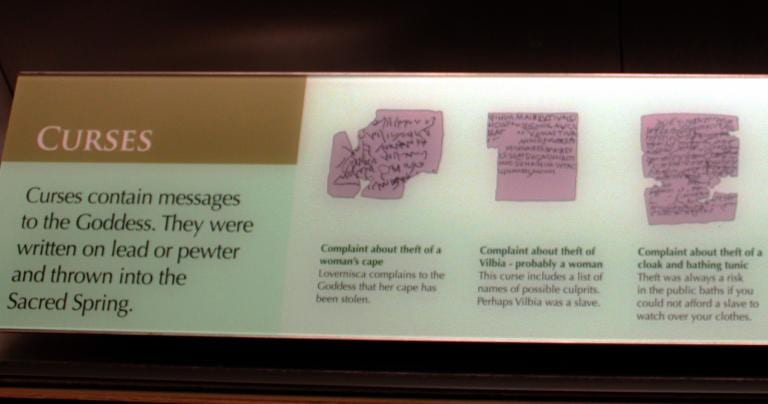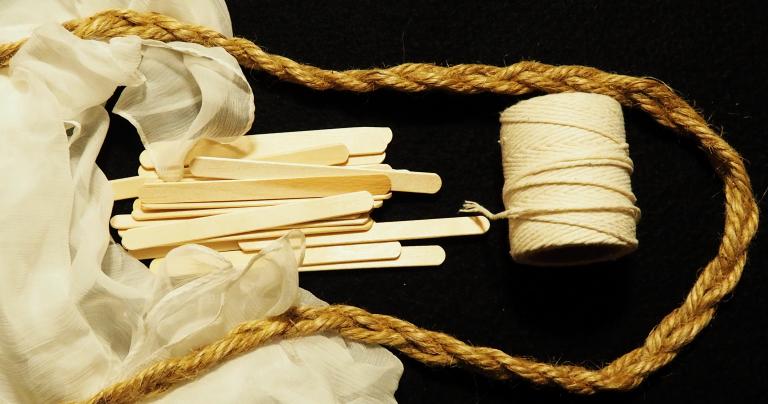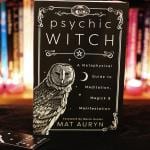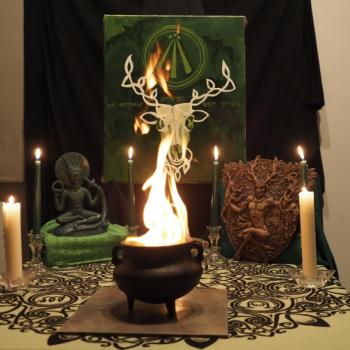This post was in my “to be written” queue for almost a month. I kept pushing it out because more urgent topics kept popping up, but also because I’m reluctant to even indirectly encourage practices that can be harmful to those who work them.
But I heard quite a bit of conversation about cursing at Austin Witchfest, and what I heard was anything but consistent.
I heard one group saying cursing is the new “in thing” and some people are throwing curses left and right over trivial matters. I heard another group saying no ethical witch would ever curse, and if they did the Threefold Law would make them regret it.
One of my goals with this blog is to be the voice of reason, even about topics most people consider unreasonable. I think we need a reasonable look at cursing, hexing, and other forms of malefica.

A witch who cannot hex cannot heal
Cyndi Brannen of the Keeping Her Keys blog had a good post on this last year. It points out that magic is like all forms of power: it’s inherently neither good nor bad. It simply is. What makes it good or bad is how and why we use it. And like applications of mundane power, there are always unintended consequences – there is no such thing as “harm none.” Intention is not everything and filling your spells with disclaimers (“for the good of all with harm to none”) does more to weaken your magic than to protect you from metaphysical blowback.
Still, there’s a difference between losing control of your car and accidentally hitting a pedestrian and intentionally running over a pedestrian. One is a potential side effect we can work to avoid, while the other is intentional harm.
But if you drive a car, you are capable of intentionally running over a pedestrian, even if you’d never do it.
Cursing is the equivalent of punching someone in the face
Either you believe magic is real or you don’t.
I see some people throwing curses because it makes them feel better to strike back at someone they’re mad at. And then when the curse takes hold, they’re upset because they hurt another person. They never would have admitted it, but it’s clear they didn’t think the curse would do anything… at least not anything serious.
Magic doesn’t always work in the way we would prefer, and it rarely works as directly as it’s portrayed in fiction. But it works – do the spell right and you’ll get the results.
If you wouldn’t punch someone in the face, you shouldn’t curse them.
Of course, sometimes we work magic instead of punching them in the face, because they’re bigger and stronger and physically attacking them would end very badly for us. That’s a different matter.
But if you’re not ready to see someone walk away with a broken nose that you caused, you shouldn’t throw curses at them.
The Three-Fold Law and the Strawberry Jam Effect
The Three-Fold law is a Wiccan principle that says whatever you send out comes back to you three times, good for good and ill for ill. A lot of the “you should never curse!” people quote the Threefold Law like it was holy scripture.
The problem is that I see no evidence it works as described. And karma is a Hindu concept that doesn’t work the way most Westerners assume it does. There is no cosmic scorekeeper and even a casual look at the world shows that most people don’t get what they deserve, whether positive or negative.
At the same time, I see ample evidence for what John Michael Greer called “the Strawberry Jam Effect” – you can’t work with it without getting it all over yourself.
You can – and should – practice good magical hygiene. Cleanse regularly, keep your shields up, and never summon demons inside your house. But if you spend more than a trivial amount of time dwelling on pain and suffering, you’re going to keep some of that pain and suffering with you even after you’re done spellcasting.
Think about what your curse will cost and decide if it’s worth it – before you cast it.
Cursing is rarely the best strategic move
A quote that dates to the early 1600s says that living well is the best revenge. In almost all cases I don’t want those who’ve done me wrong to suffer nearly as much as I want to do well myself. So if I have a certain amount of energy to expend (whether magical or physical) I’d rather spend it building me up than knocking them down.
Even if there’s an active conflict, it’s generally easier and more reliable to protect yourself than to attack someone else. Shielding is part of my daily routine, and in difficult times I increase it. Charging a protective amulet is easier and more reliable than sending demons to attack someone. I prefer to pray for strength and deliverance for myself rather than for the Gods to smite my enemies… although imprecatory prayers did not originate with Christians.

The most important part of any magical working is target selection. What do you want most: suffering for your enemy or success for yourself?
Witchcraft is the recourse of the dispossessed
Sooner or later, though, there comes a time when protecting and uplifting yourself isn’t enough. Someone is punching you in the face, magically, metaphorically, or perhaps even physically. And while I prefer to respond strategically and non-violently where ever possible, at the end of the day I am not a pacifist.
Witchcraft is the recourse of the dispossessed, the powerless, the hungry and the abused. It gives heart and tongue to stones and trees. It wears the rough skin of beasts. It turns on a civilisation that knows the price of everything and the value of nothing.
Peter Grey – Apocalyptic Witchcraft
Historically, people have turned to witchcraft because ordinary avenues of power were closed to them. They were female or poor or both, religious minorities, or people who had powerful enemies. If they couldn’t get what they needed through ordinary means they got it through extraordinary means.
If someone is harming you and you can’t make them stop through ordinary means, why wouldn’t you use magic? Why play by the rules when the rules were written by those who have demonstrated their intent to oppress you and others?
Cursing is violence, and like all violence it’s expensive, messy, and brings collateral damage. But if the only other choice is submitting to oppression, then cursing is the right thing to do.
A progression of baneful magic
A quote from Wonder Woman say “don’t kill if you can wound, don’t wound if you can subdue, don’t subdue if you can pacify, and don’t raise your hand at all until you’ve first extended it.” While that was said from the perspective of someone in a position of greater power, it remains a good guide to working baneful magic.
Begin with ordinary effort. Can you remove the problem? If so, you’re done. Where it will work, ordinary effort is always more reliable than magic.
But if ordinary effort won’t fix the problem, work protective magic: shielding, warding, protective amulets, and asking for the protection of your Gods and other spiritual allies.
The next step is reflective magic: mirror spells and such, to send whatever your enemy is doing back at them. Unlike some, I don’t believe this is an example of “harm none” but it is a low-intensity working that can solve your problem without a huge confrontation.
Moving up the scale, next try banishing. Conjure up a great job for them – in another state. Or use one of the many hotfoot spells from traditional witchcraft. Don’t hurt them, just get them out of your way.
They won’t stop and they won’t leave? It’s time to bind them. A binding constrains someone from doing something. Freezer spells are good for this, though I prefer to create a poppet and tie it up with cord.
Some people think binding crosses an ethical line. I see it as the next rung on the ladder. The absolute autonomy of the individual human is not an inviolable law of Nature.
The more aggressive curses
If binding doesn’t work (or more likely, if it doesn’t work completely) then it’s finally time for the more aggressive curses. Even here I recommend a progressive approach (“don’t kill if you can wound”) rather than jumping straight to deadly magic.
A killing curse is the moral equivalent of pointing a gun at someone and pulling the trigger. There are times when lethal self-defense is necessary and appropriate. At any other time, shooting someone is murder. While the law isn’t always a reliable guide to ethics (frequently it’s anything but that) the reasoning behind the law is useful.
If you believe magic is real, treat these curses like you’d treat a loaded gun.
If you don’t believe magic is real, why are you reading this post?
I’m not going to provide you with a list of curses. I’ve found that by taking a progressive approach I rarely need to resort to binding, much less to aggressive curses. And the few times I have, I’ve written custom spells for that specific situation. Developing your own curse will help focus your will toward your goal… or convince you that you don’t really want to do it.
Cursing is the big hammer in the toolbox of the magician. You don’t need it often, and if you try to use it when you need a smaller tool you’ll just make things worse.
But when you need it, you need it.



















